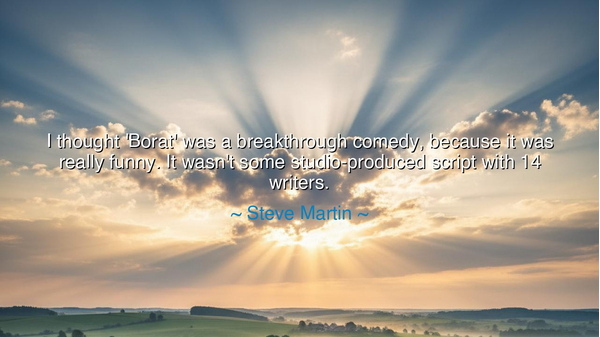
I thought 'Borat' was a breakthrough comedy, because it was
I thought 'Borat' was a breakthrough comedy, because it was really funny. It wasn't some studio-produced script with 14 writers.






When Steve Martin declared, “I thought Borat was a breakthrough comedy, because it was really funny. It wasn’t some studio-produced script with 14 writers,” he was not merely praising a film — he was affirming the eternal power of authentic creation, of vision over machinery, of truthful art over manufactured entertainment. Beneath his words lies the ancient wisdom that true laughter, like true music or poetry, must spring from a single, daring soul — one who dares to speak without the polish of committees, and who dares to be foolish in a world that worships safety. Martin, himself a master of comedy’s craft, was recognizing in Borat what artists since the dawn of civilization have always revered: purity of intent — the spark of creation untainted by the machinery of conformity.
The origin of this quote lies in Martin’s response to Borat: Cultural Learnings of America for Make Benefit Glorious Nation of Kazakhstan (2006), a film created by Sacha Baron Cohen, an artist who wielded satire like a sword. The film was not born from the careful deliberation of studios or a room full of writers; it was born from bold improvisation, risk, and raw truth. Baron Cohen walked into the world unarmored, exposing both himself and his subjects, revealing the absurdity of society by holding up a distorted mirror. What Martin saw — and admired — was that this was not “produced” comedy; it was lived comedy, sprung from the soil of genuine daring.
The ancients, too, celebrated this kind of authenticity. The Greek playwright Aristophanes, whose sharp tongue spared no one, dared to make Athens laugh at its own folly. His works were not written by councils, nor softened by the hands of many; they were the voice of one mind, unafraid of scandal. Likewise, in ancient Rome, the poet Juvenal wielded satire against corruption and excess, and though his words risked his safety, they also secured his immortality. Martin’s admiration for Borat belongs to this same lineage — the recognition that comedy, when born from courage rather than commerce, becomes philosophy disguised as laughter.
In the modern age, much of art is diluted by collaboration without vision — too many voices speaking at once, too many hands shaping the clay until the form loses its soul. A work designed by committee often feels hollow, not because those who make it lack skill, but because they lack unity of spirit. True creation demands singularity — the risk of one heart speaking alone. Borat was such a creation: raw, uncomfortable, fearless, and therefore alive. Martin, who came from an era of stand-up and self-made performance, recognized that spark immediately — the sacred fire of the artist who answers to no one but the truth.
There is also humility in his observation, a respect for the unpredictable nature of genius. Comedy, at its highest form, is not about pleasing everyone — it is about revealing the hidden pulse of human absurdity. Baron Cohen’s characters, like the jesters of medieval courts, spoke truths that the powerful dared not hear. They provoked laughter, yes, but beneath that laughter was the sting of recognition. Martin, a philosopher-comedian in his own right, knew that humor of this kind is not written by formulas or polished by marketing executives. It is born in chaos, raised in courage, and delivered in truth.
Consider the great sculptor Michelangelo, who, when asked how he carved David, replied that he simply removed all that was not David from the marble. So too with comedy — the artist must carve away all that is false, all that is calculated, until only truth remains. A studio with fourteen writers adds, layers, and compromises; an artist like Baron Cohen strips away. Martin’s praise for Borat was not about vulgarity or shock — it was about purity, about the unfiltered expression of a single human insight. He was saying, in essence: “This is what art looks like when it has not forgotten its origin.”
And so, dear listener, let this be your lesson: that greatness, in art or in life, does not come from the safety of numbers but from the bravery of singular vision. Do not seek the comfort of consensus, for consensus smooths the edges that make truth shine. When you create — whether in words, in work, or in living — create with conviction, not calculation. Be willing to offend, to fail, to look foolish. For the world may reward mediocrity with applause, but history remembers only the fearless — those who dared to make something strange, something real, something born from the undivided spirit.
In this way, Steve Martin’s words endure as a hymn to the integrity of creation. He reminds us that art which truly moves the world must begin not in the boardroom but in the heart. Whether you write, speak, or dream, remember this: the truest laughter — like the truest beauty — is not designed. It is discovered. It is lived. It is, as he said of Borat, “really funny” not because it tries to be, but because it dares to be true.






AAdministratorAdministrator
Welcome, honored guests. Please leave a comment, we will respond soon